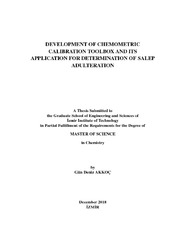Please use this identifier to cite or link to this item:
https://hdl.handle.net/11147/7182Full metadata record
| DC Field | Value | Language |
|---|---|---|
| dc.contributor.advisor | Özdemir, Durmuş | - |
| dc.contributor.author | Akkoç, Gün Deniz | - |
| dc.date.accessioned | 2019-07-16T12:48:36Z | |
| dc.date.available | 2019-07-16T12:48:36Z | |
| dc.date.issued | 2018-12 | - |
| dc.identifier.citation | Akkoç, G.D. (2018). Development of chemometric calibration toolbox and its application for determination of salep adulteration. Unpublished master's thesis, Izmir Institute of Technology, Izmir, Turkey. | en_US |
| dc.identifier.uri | https://hdl.handle.net/11147/7182 | - |
| dc.description | Thesis (Master)--Izmir Institute of Technology, Chemistry, Izmir, 2018 | en_US |
| dc.description | Includes bibliographical references (leaves: 75-77) | en_US |
| dc.description | Text in English; Abstract: Turkish and English | en_US |
| dc.description.abstract | A chemometric calibration toolbox, which contains Inverse Least Squares (ILS) regression, Principle Components Regression (PCR), Partial Least Squares Regression (PLSR), Genetic Inverse Least Squares (GILS) regression, and Ridge regression, was developed in MATLAB environment. During the development, multiple strategies to improve the calculation speed, namely vectorization and parallelization, were employed. Besides these programmatic strategies, efficient cross-validation (CV) procedures were implemented that are specifically tailored for parameter tuning of PCR and PLSR. For GILS, by constructing CV matrices in advance, the computational cost was further reduced. Additionally, a Graphical User Interface (GUI), which also includes baseline correction and variable range selection capabilities, was developed. For increased convenience, regardless of the chosen model, the toolbox returns a single vector of regression coefficients that accounts for centering and scaling of variables along with variable selection. Using the developed toolbox, quantitative determination of salep adulteration was carried out through chemometric calibration methods on Mid-IR data obtained from FTIRATR which is a fast and easy-to-use spectroscopic instrument. The main motivation was the lack of an established method for determination of adulteration of salep which can be quite common due to very high price of pure salep, despite the strict legal regulations. Using 365 samples covering a wide range of adulteration scenarios with 20 adulterants, calibration models were obtained and evaluated. Ensemble model, obtained by averaging GILS and Ridge, yielded the best RMSEP of 6.82 (w/w %). To cope with the unspecific adulterant problem, SIMCA was employed to provide an qualitative insight about the presence of such compounds. | en_US |
| dc.description.abstract | Ters En Küçük Kareler (ILS) Regresyonu, Temel Bileşen Regresyonu (PCR), Kısmi En Küçük Kareler Regresyonu (PLSR), Genetik Ters En Küçük Kareler (GILS) Regresyonu ve Ridge Regresyonu uygulamalarına olanak sağlayan bir kemometrik kalibrasyon paketi MATLAB üzerinde geliştirildi. Geliştirme aşamasında yazılımın hızlandırılması amacıyla vektörizasyon ve paralelizasyon yöntemleriden faydalanıldı. Bunun yanı sıra, PCR ve PLS metotlarında parametre optimizasyonu için verimli hesaplama prosedürleri kullanıldı. GILS metodunda ise CV matrislerinin tek sefer hesaplanması yoluyla hız konusunda iyileştirmeler gerçekleştirildi. Ek olarak geliştirilen Grafiksel Kullanıcı Arayüzü (GUI) üzerinden hem zemin kayması düzeltmesi ve değişken çıkarma hem de kolay bir kullanıcı deneyimi hedeflendi. Ortalama, normalizasyon ve değişken çıkarımının yanı sıra, kullanılan kalibrasyon tekniğinden de bağımsız olarak regresyon katsayılarının tüm bu işlemleri kapsayacak ve boyutu girdi boyutuna eşit tek bir vektör ile ifadesi sağlandı. Geliştirilen bu yazılım paketi vasıtasıyla, hızı ve kolay kullanımı ile bilinen FTIRATR spektrometresi kullanılarak elde edilmiş Mid-IR verileri üzerinden, salepte sahteciliğin kantitatif olarak belirlenmesine yönelik kemometrik kalibrasyon çalışmaları gerçekleştirildi. Bu çalışmanın temel motivasyonu, yasal düzenlemelere rağmen yüksek fiyatı nedeniyle salebin sahteciliğe maruz kalma potansiyelinin yüksekliği ve bu konuda halihazırda bir metodolojinin bulunmamasıdır. Bu amaçla, 20 adet tağşiş malzemesini farklı oranlarda bulunduran 365 örnek hazırlanarak olabildiğince çok tağşiş senaryosunun kapsanması hedeflenmiştir. Bu örneklerin Mid-IR spektrumları ile çalışılan kalibrasyon metotları arasında, GILS ve Ridge regresyonlarının ortalaması ile elde edilen kombine model 6.82 (w/w %) RMSEP bas¸arımı ile en uygun model olarak belirlendi. Modele dahil edilmemiş tağşiş malzemelerinin varlığının belirlenmesinde ise SIMCA yönteminin kalitatif bir önbilgi için kullanılabileceği gösterildi. | en_US |
| dc.format.extent | xi, 91 leaves | - |
| dc.language.iso | en | en_US |
| dc.publisher | Izmir Institute of Technology | en_US |
| dc.rights | info:eu-repo/semantics/openAccess | en_US |
| dc.subject | Chemometrics | en_US |
| dc.subject | Salep adulteration | en_US |
| dc.subject | Chemometric calibration toolbox | en_US |
| dc.subject | Mid-FTIR-ATR | en_US |
| dc.title | Development of Chemometric Calibration Toolbox and Its Application for Determination of Slep Adulteration | en_US |
| dc.title.alternative | Kemometrik Kalibrasyon Yazılım Paketi Geliştirilmesi ve Salep Tağşişinin Belirlenmesinde Kullanılması | en_US |
| dc.type | Master Thesis | en_US |
| dc.institutionauthor | Akkoç, Gün Deniz | - |
| dc.department | Thesis (Master)--İzmir Institute of Technology, Chemistry | en_US |
| dc.relation.publicationcategory | Tez | en_US |
| dc.identifier.wosquality | N/A | - |
| dc.identifier.scopusquality | N/A | - |
| item.openairecristype | http://purl.org/coar/resource_type/c_18cf | - |
| item.cerifentitytype | Publications | - |
| item.languageiso639-1 | en | - |
| item.grantfulltext | open | - |
| item.fulltext | With Fulltext | - |
| item.openairetype | Master Thesis | - |
| Appears in Collections: | Master Degree / Yüksek Lisans Tezleri Sürdürülebilir Yeşil Kampüs Koleksiyonu / Sustainable Green Campus Collection | |
Files in This Item:
| File | Description | Size | Format | |
|---|---|---|---|---|
| T001862.pdf | MasterThesis | 9.39 MB | Adobe PDF |  View/Open |
CORE Recommender
Items in GCRIS Repository are protected by copyright, with all rights reserved, unless otherwise indicated.